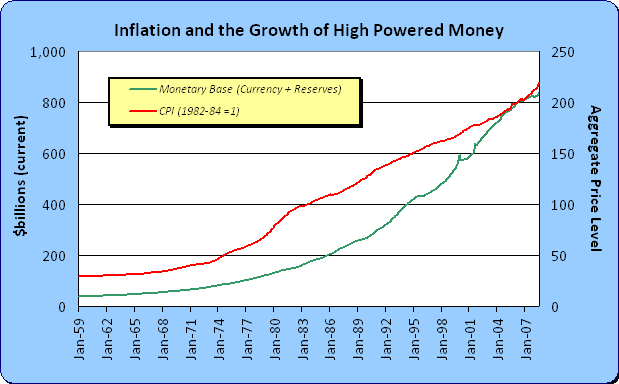I have long agreed with the monetarists (famously Milton Friedman) that inflation is always and everywhere a monetary phenomenon. This hypothesis seems to be strongly supported by the data:
The simple way to understand this is to think about what seems to be a basic accounting identity. Simply, the quantity of money (M) and how many times it is used in a year (call this V) must equal the total value of output in an economy (call this P x Y). Irving Fisher is believed to have first recognized this. Milton Friedman popularized it. Story has it that the Friedman’s vanity plate read, “MVPY.” If I did that it would be dorky. But I guess the Friedman’s could pull it off.
Depending on your view of how much money is used in a given year (is V constant?) you can draw conclusions about the relationship between the money supply, output and prices. In the long run, it is pretty apparent that increases in the money supply must be accompanied by increases in the price level, because output is determined by real forces of supply and demand in an economy.
But because the equation of exchange is an identity does not mean you can draw strict ex-ante policy conclusions from it. Even though this seems to be an economic theory, it is missing some important economics (this is where my reconsideration of beliefs comes in). The point being, is that not thinking like an economist about the equation of exchange (or Keynesian multipliers) will lead us to draw some conclusions that are scientistic, and not scientific. Are we to believe that if the supply of money changes (either increases or decreases) that people’s behavior will not change. In the case of a shrinkage (in the limit, how about the complete elimination of the government money stock) do we really think that private individuals will not find substitute monetary tools, and pretty fast? I suppose you could build such a response into a dynamic modeling of velocity – but simply looking at this equation as a static identity does not allow for such a thing. And do we believe that as the nature and types of money change, the relationship between M and the real economy is the same? And do we believe that this relationship is the same at all levels of prices and output?
Until recently, I never thought hard about it. But all of the recent discussion of the impact of Obama’s stimulus plan on the real economy can just as well be applied to other ideas that are similar in nature.
Does this mean that increases in the money supply do not lead to inflation? Heck no. But it does mean that it would be silly to apply precise predictions about exactly how much aggregate prices will change in response to a particular change in the money stock. To assert more than that would be akin to predicting exactly how billions of economic agents would respond to changes in various economic signals, and that is just not possible … nor scientific.
